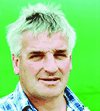Arable Farmer of the Year Finalist – David Sunnucks

David Sunnucks – Maydays Farm, Mersea Island, Essex
When your first stab at growing a novel crop is not 100% successful, double the area and make sure you obtain better harvesting kit.
It’s that sort of approach that typifies Essex-based David Sunnucks’ enthusiasm for arable farming.
Having received a “reality check” in 2003 on a Worshipful Company of Farmers’ advanced business management course at Wye College, Mr Sunnucks completely revamped the all-arable business he runs on 566ha of rented land within 15 miles of Maydays Farm, Mersea Island.
“I’m a passionate farmer was determined to make my arable farming profitable in its own right.”
That meant ignoring the single farm payment, reducing working capital, machinery and cultivation costs, and exploring ways to
| Farm Facts |
|---|
|
The key cropping change was to drop grassweed-inducing second wheats and create a six-year rotation with high erucic acid oilseed rape, oats and for the first time last year borage, as breaks.
The latter, with a target yield of just 0.4t/ha, radically reduced storage demands. And despite last harvest’s output of only half that, Mr Sunnucks is convinced he can achieve more of the high value crop given new swathing equipment he sourced from Canada.
Block cropping on land which ranges from structureless marshland “pug” to gravel, helps his two full-time staff boost efficiency.
“Last year we had 130 acres of borage. This year, mainly because of blocking, we’ve doubled that.”
Once all the land was ploughed. Now, thanks to the new rotation and investment in a Vaderstad drill, only a third is so treated with it all done in the autumn to conserve moisture in spring.
Despite annual rainfall averaging only 480mm (19in) yields are good, HEAR outyielding double-low varieties and low input oats, which Mr Sunnucks finds compete well with weeds, averaging 8.6t/ha.
Wheat for the heavy and light land respectively are Ambrosia for feed and Solstice for milling.
A second sprayer to ensure timely treatments has been another investment, all redundant equipment having been sold.
Fertiliser is applied by pneumatic spreader, and he uses GPS to guide cultivations though not yet for yield-mapping. “I’m still not sure how one should use the information.”
Having breaks definitely eases weed control but ryegrass brought in, he suspects, on a neighbour’s baler has been a real challenge for him and his agronomist, the AICC’s Bruce Hill, for five years.
“The problem is that it’s resistant. We’ve tried roguing, but it’s very difficult to get rid of.”
Marketing is one of the most important aspects of the business, he stresses. As a result all the breaks are grown for specific markets under agreed contracts. “This reduces my risk and gives me known prices to work to.”
As a rule he sells half the wheat, his “commodity” crop, forward, trading the rest after harvest. And he is fully prepared to use options if sensibly pitched to protect returns in the light of more volatile prices.
Care for the environment is very much part of his operation. He entered Countryside Stewardship four years ago and has margins round most fields.
He has also planted many roadside hedges, mostly without grant aid, and established four small woodland blocks.
As one of only four farmers on the island, Mr Sunnucks would like to expand the business. But logistically, without a Colchester by-pass, that is tricky, he acknowledges.
CATEGORY JUDGES



Last year’s winner, Robert Law, Philip Wynn, Wynn Business Partnerships and Andrew Blake, Farmers Weekly’s senior arable reporter.
| What the judges liked |
|---|
|

